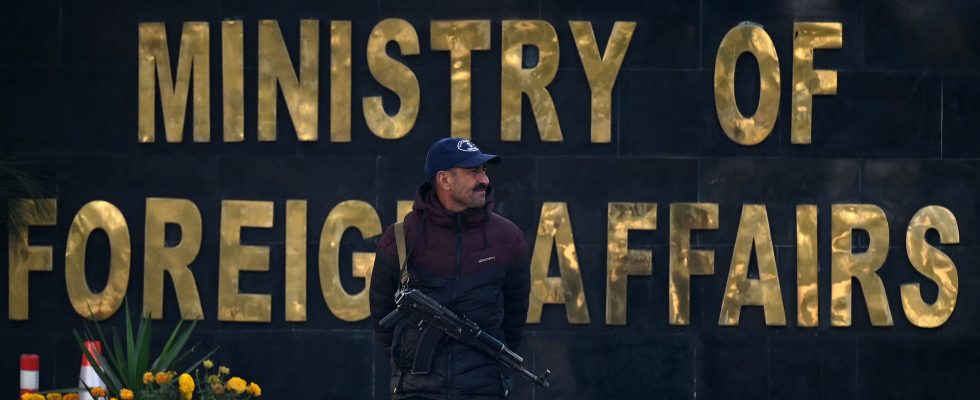The conflict between Israel and Hamas contaminates the region. Two days after an Iranian attack on its territory, Pakistan announced on Thursday January 18 that it had carried out “strikes against terrorist hideouts” in Iran during the night, which left nine people dead according to Iranian state media. Pakistan, the only Muslim country with nuclear weapons, and Iran have both faced smoldering insurgencies along their shared border for decades. And the tension rose a notch.
These reciprocal attacks occur in an explosive context: the Middle East is shaken by the war between the Palestinian Islamist movement Hamas and Israel in the Gaza Strip and attacks by Houthi rebels from Yemen, supported by Iran, against ships of trade in the Red Sea. “This morning, Pakistan carried out a series of precision, highly coordinated and specifically targeted strikes against terrorist hideouts in the province of Sistan-Baluchistan”, in the south-east of Iran, announced in a press release the Pakistani Ministry of Foreign Affairs. “The measure […] “was taken in light of credible intelligence on imminent terrorist activities on a large scale,” he said, affirming that a “certain number of terrorists” had been killed.
At least nine people, including four children and three women “all of non-Iranian nationality”, were killed in border villages, Iranian state media reported, citing the deputy governor of Sistan-Baluchestan province, Alireza Marhamati. The Pakistani charge d’affaires was summoned to give “explanations”, they also announced.
China positions itself as mediator
Iran and Pakistan frequently accuse each other of allowing rebel groups to operate from each other’s territories to launch attacks, but it is rare for either country’s forces to be involved. “Pakistan fully respects the sovereignty and territorial integrity of the Islamic Republic of Iran,” assured the Pakistani Foreign Ministry. “The sole objective of today’s (Thursday) action was to work for the security of Pakistan and our national interest, which are paramount and cannot be compromised,” he added. China, which maintains privileged ties with Islamabad and Tehran, said on Thursday it was ready “to play a constructive role to calm the situation”.
Pakistan responded to the Iranian strike carried out on Tuesday January 16 against “terrorist targets” in Pakistan. According to Pakistani media, the attack occurred near Panjgur, in the southwest of Balochistan province (West), where Pakistan and Iran share a border of a thousand kilometers. Baluchistan, Pakistan’s largest, least populated and poorest province, which also borders Afghanistan, has been rocked intermittently for decades by a separatist rebellion. The province is rich in hydrocarbons and minerals, but its population complains of being marginalized and robbed of its natural resources.
Iran shows its muscles
The attack targeted the headquarters in Pakistan of the jihadist group Jaish al-Adl (Army of Justice in Arabic). Formed in 2012, it has carried out several attacks on Iranian soil in recent years. The last, against a police station, left 11 dead in December 2023. The group is considered a “terrorist organization” by the United States. Islamabad on Wednesday deemed this attack, which caused the death of two children, “totally unacceptable” and unjustified. In the wake of Wednesday’s attack, Pakistan marked the diplomatic crisis: it recalled its ambassador and “expelled the Iranian envoy to Islamabad”, underlines Dawn. Iranian Foreign Minister Hossein Amir-Abdollahian insisted on Wednesday that “Jaish al-Adl is a terrorist group that acts against the common security of the two countries.”
Lately, Iran seems to want to flex its muscles in the region. Objective: prove that he can hit from long distance. A show of force for which Iraq and Syria paid the price since they were the target of salvos of ballistic missiles on Tuesday January 16. Tehran said it had targeted “terrorists” in Erbil, in Iraqi Kurdistan, and in Idlib, in Syria, the Guardians say. Among the victims killed in Kurdistan was real estate tycoon Peshraw Dizayee. The Iranian newspaper, Jam-é Jam, publication of state television, taken up by International mail, accuses him of having collaborated with Israeli intelligence in Erbil. For the media, this is a “clear message from Iran to the Zionist regime”. For its part, the United States is trying to play its role as world policeman, by condemning its strikes. With the hope also of preventing the conflict from spreading to the Middle East.
